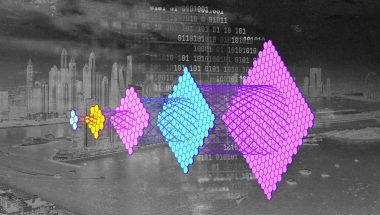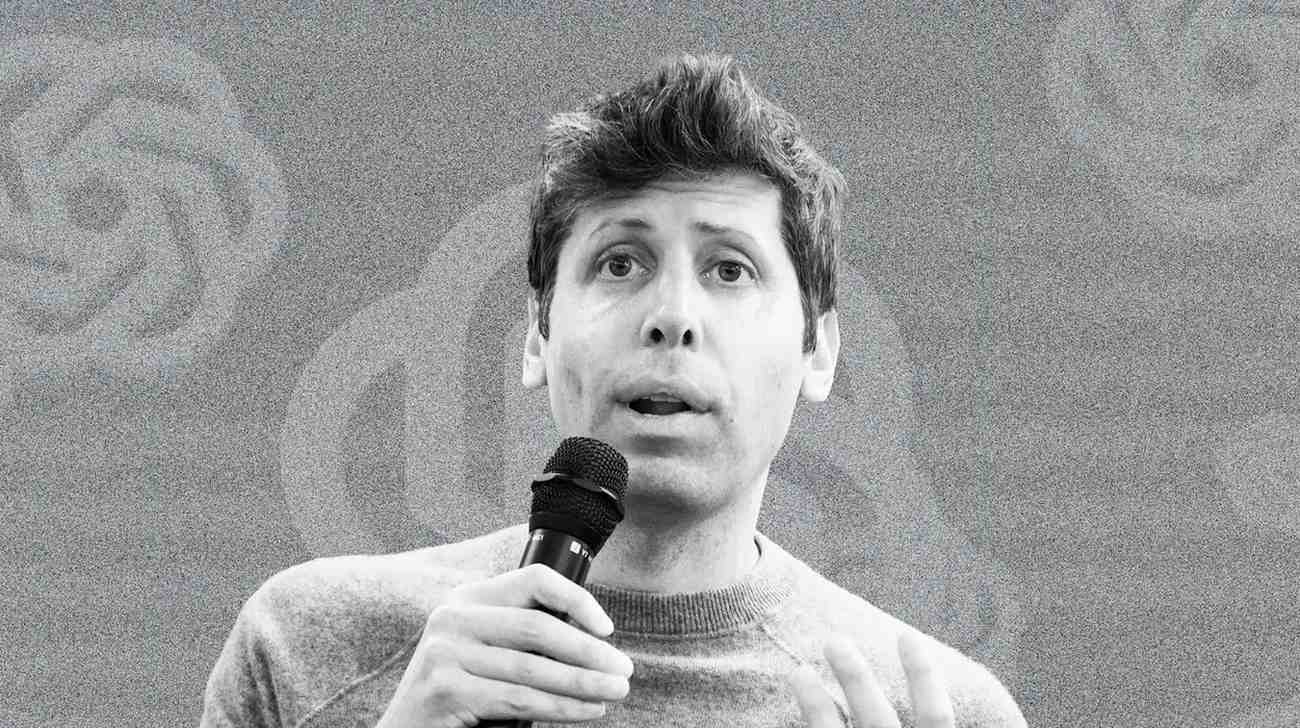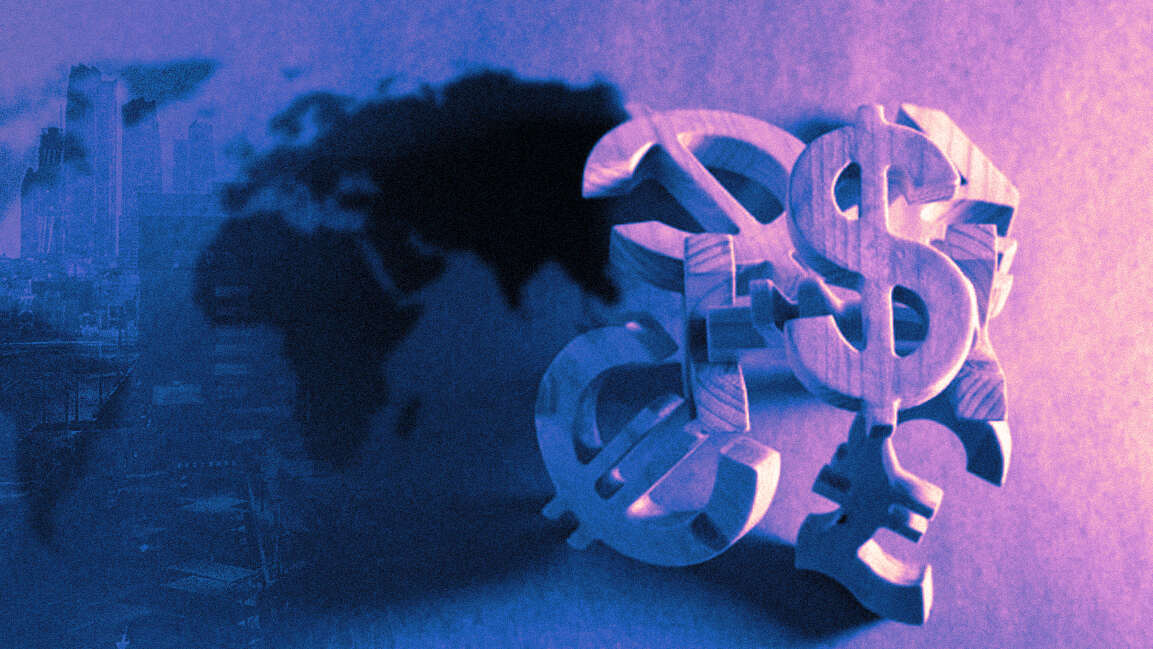- | 9:00 am
Robert Downey Jr. tells us why he became an online safety app’s brand advocate
The actor has signed up with security and privacy company Aura as an investor, board member, and spokesperson. ‘What a great education this will be,’ he says.
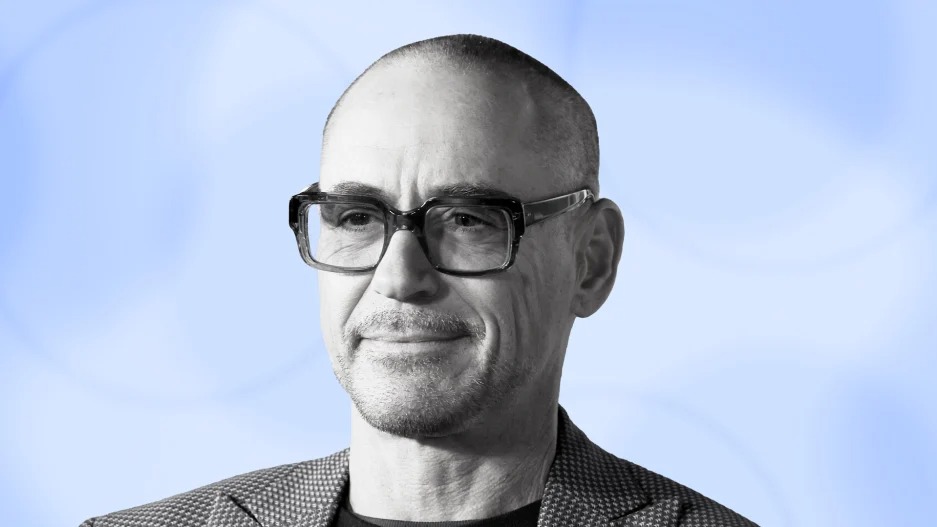
If you are at least mildly surprised to learn that Robert Downey Jr. is the new public face of a suite of digital security, privacy, and safety tools called Aura, that’s perfectly understandable. Even Robert Downey Jr. says it’s not the sort of thing he’d expect Robert Downey Jr. to do.
“It’s not a natural fit for me, an online safety app,” he acknowledges at the start of our conversation. “I am also fortunately not in a position in my life where I am in search mode for a partnership with a brand, so to speak.”
But when Hollywood mogul-investor Jeffrey Katzenberg—a friend of Downey’s and an Aura board member—proposed some sort of collaboration, the actor found himself unexpectedly intrigued. Not because it was an obvious idea that played into his areas of expertise, but because it didn’t.
This is so above my pay grade, and so outside my realm of understanding, he remembers thinking. I would love to do a deep dive on this.
While Downey’s “brand advocate” title reflects his role in generating publicity for Aura, it’s not a conventional endorsement deal. He’ll also serve as a strategist, invest in the company, and join its board. He’s quick to note that if the Boston-based unicorn does well, there could be “huge financial upside” for him as an investor. But he adds that affiliating himself with an online safety company is about more than the potential for profit: “The idea that you can be unwittingly targeted by bad actors and that you’re 10 or 11 years old, to me, is a horrifying prospect.”
As for Aura, it’s certainly pleased to have Downey speaking on its behalf, including in a video titled “Role of a Lifetime” as well as at the imminent South by Southwest festival in Austin, where he’ll moderate a session about online crime featuring Aura founder and CEO Hari Ravichandran. However, Downey’s deeper commitment to being part of the team matters as much as the public-facing aspect.
“We knew that we didn’t want somebody who was a hired gun—a ‘we’re going to pay you this much money, come do an ad for us’ type of thing,” Ravichandran says. “We wanted a real partner in the mix, and that was the only way that Robert would engage.” Nine months of discussion led to Downey signing a 10-year agreement to work with the company.
“I don’t know how me being on the board is going to be that helpful—you know, I crack jokes,” Downey says. “I do have feedback, and I think I can help with messaging. And partnering with them on the consumer education side, I think, is good. I have a pretty good platform.”
REAL-WORLD HEROICS
Though Downey is resolutely self-effacing when it comes to his own technological chops, he’s famous for playing Iron Man, that most tech-savvy of superheroes. The association helps explain why people might pay attention when he talks about an online safety product, and it even influences his perspective.
In 2015’s Avengers: Age of Ultron, he says, “Tony Stark is talking about this huge Star Wars-type thing that he’s going to build around our planet after all these alien threats, and it doesn’t go so well.” With Aura, “just in my dumb, super-simple, middle-aged guy rationale, I was like, ‘Wow, maybe, maybe there’s a way to actually get involved in this real-world issue and have some sort of corrective experience.’”
Tackling real-world issues matters to Downey in part because his day job involves entertaining people. (“I’m not saying that entertainment is not a real service, I’m just saying that it is not a real-world service,” he clarifies.) That desire to make a meaningful contribution drives his business activities, which he says take up 49% of his time, “and I’m hoping it goes to and past 51%.” With his wife Susan Downey and others, he runs FootPrint Coalition, which invests in startups with a sustainability angle, from a smarter home electrical panel to vegan bacon to classic cars that have been converted into EVs. FootPrint also funds scientific research by making “fast grants,” an effort Downey wrote about in a 2021 Fast Company article.
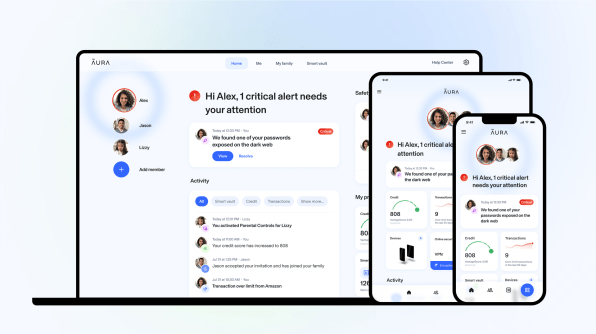
Even if online crime doesn’t present as existential a threat to the planet as the climate crisis, it’s undeniably a vast problem: In 2021, the FBI received complaints from U.S. consumers and businesses totaling $6.9 billion in losses. Aura’s app encompasses a lot of stuff designed to help consumers defend themselves, including protection against identity theft and financial fraud, an antivirus tool, a password manager, a virtual private network, parental controls, and other features, all integrated into one experience for computers, smartphones, and tablets. Pricing ranges from $144 a year for a single adult to $444 for a plan that covers five grown-ups and an unlimited number of kids.
NOBODY WILL EVER SAY THAT I DON’T HAVE AN INCOMPLETE EDUCATION, BUT I THINK I’M AUTHENTIC IN REPRESENTING MYSELF HONESTLY.”
Aura is not exactly pioneering a new market: In fact, every aspect of its offering faces competition from well-entrenched products. But Ravichandran says that the company can succeed by offering a unified, modern app that gives its users one place to go to address all the risks they face. “People just feel overwhelmed with the problem in general,” he says. “Current solutions in the market are very fragmented. Some of them were probably built in the ’90s for a desktop user who was not as connected. We see now that with a typical family, they have 25 points of connection inside their household.”
Ravichandran also says that there’s still plenty of opportunity to make online safety more painless by applying AI, automation, and other technologies. For example, if a user uploads a living will containing a Social Security number, Aura will automatically scan the dark web to see if that number is out there. Other features are in the works, including the ability for the password manager to periodically change account passwords on a user’s behalf, no human intervention required.
Just as an Aura user, Downey says he’s impressed. “I utilized until recently, and in certain cases still use, some of these other products that shall remain nameless,” he says. “Many of them do a good job.” But “having really kicked the tires on [Aura], I feel that it’s singular in how comprehensive it is.”
But again, he emphasizes that his goal with this partnership is not to pass himself off as a security expert, but rather to come out smarter on the other end. “Nobody will ever say that I don’t have an incomplete education,” he says. “But I think I’m authentic in representing myself honestly, as someone who is like, ‘Come join me while I go on this journey of learning and trying to figure out a creative solution.’”
Will that be enough to make it clear to people why he chose to get involved with Aura? Ultimately, Downey tells me, that’s not the most important thing about the project.
“You know what?” he says. “Whether it is or not, I know why I’m doing it.”











